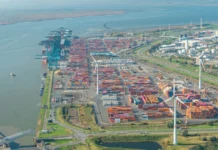
The Port of Riga and the Freeport of Riga Authority have expressed their intention to invest in green energy, smart technologies and information technology (IT) projects in order to develop economic and business processes.
Particularly, the Freeport of Riga Authority is planning to invest almost US$1.13 million (€1 million) in the implementation of port digital technology and IT solution projects this year.
Energy efficiency, automation of port processes and speed of cargo movement constitute the most important issues, which are expected to further affect the Latvian port’s competitiveness.
“Every stevedore working in the port of Riga and every company operating in the port will have to become more efficient in terms of energy consumption, be able to be greener and to provide investments in green technologies,” stated Ansis Zeltins, the Freeport of Riga CEO.
“The second important direction is digitalisation so that we can keep pace with today’s global transport and logistics development trends and directions,” added Zeltins.
The port comprises warehouses with a total area of at least 50,000 m2, which could be operated with solar panels. More than 85% of funding for the energy transition in the port can come from the European Union, according to a statement.
“Green technologies have huge support from Europe, with co-financing of up to 85% in some cases, which means that the investment would pay off very quickly,” said Rihards Strenga, Executive Director of the organisation representing the interests of companies working in the Port of Riga.
“While there are undoubtedly many different criteria that need to be met in order to receive funding, if everything goes as planned, it is certainly an investment worth millions,” said Strenga, who added, “If we assess the average investment in the port sector in Europe, then any medium-sized investment starts at US$113.4 million (€100 million).”
Regarding the development of digitisation at the European port’s processes and cargo handling operations, many companies operating at the port, have already automated and digitised a large part of their daily work.
However, the common ambition of the port is to create a unified cargo accounting system, which would be connected to the customs and other public services, thus significantly reducing the circulation of paper documents and significantly increasing the capacity and speed of cargo movement.




